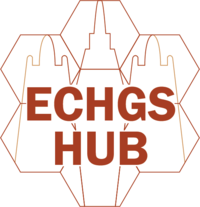ECHGS Hub conference, 15 Nov 2023 (online)
The Endangered Cultural Heritage in the Global South Hub (ECHGS)

The Endangered Cultural Heritage in the Global South Hub (ECHGS) provides a focal point for research on Cultural Heritage challenges in the Global South, especially ODA eligible countries of the Middle East and Africa. The Hub complements and extends the existing Oxford University Heritage Network (OUHN) with a stress on the social science dimensions of cultural heritage.
The ECHGS will facilitate interdisciplinary research on how cultural heritage is created, identified, valued, and protected by local populations, experts, international agencies, and academics and threatened by conflict, climate change, and development. The longstanding relationships between the first world and the Global South make cultural heritage both a critical focus for decolonization debates and actions, and central to highly topical discussions regarding UK (and international) Official Development Assistance (ODA) programmes. The ECHGS will also serve as a hub for hosting large open-access databases of cultural heritage and archaeology in Oxford, facilitating multi-disciplinary research on the cultural heritage of the Global South.
The ECHGS will also provide a vehicle for engagement with relevant external stakeholders in the UK and in the Global South, including NGOS, the media, government departments and policymakers, funders, and communities. We will examine the connection between cultural heritage (tangible and intangible), people, and place, where cultural heritage creates social identities, yet the connection to place is threatened by climate change, conflict, development, and tourism.
Numerous staff and DPhil students across the Social Sciences Division currently undertake research on or related to endangered cultural heritage in the Global South. The range of disciplinary approaches and affiliations has meant that many researchers work in isolation despite the work of the OUHN, often relatively unaware of the shared and compatible research interests present, or the multiple research perspectives and potential theoretical, methodological, and case synergies. Many people working in this area are graduate students or on fixed term contracts which means that without some form of institutional platform there are significant risks of loss of knowledge and continuity through staff turnover. ECHGS will bridge the gaps between individual, departmental and disciplinary interests through workshops, seminars, and the shared production of funding applications.
The team and contact points:
Digital Heritage and the Global South
Online conference
Tuesday 15 July 2025
12:00-16:30 UCT+1/BST (UK time)
The rapid integration of Artificial Intelligence (AI) and digital tools into heritage practices is transforming how we document, study, interpret, preserve, and engage with the past. While these technologies offer significant opportunities, they also raise critical questions around authenticity, ownership, access, and power. Such issues are particularly pressing in regions shaped by colonial legacies, digital divides, and struggles for cultural sovereignty.
The Endangered Cultural Heritage in the Global South (ECHGS) Hub at the University of Oxford is organising the Digital Heritage and the Global South online conference on 15 July 2025. This online event will critically examine the theoretical, ethical, political, and environmental implications of AI and digital technologies for cultural heritage in the Global South, without dismissing their value, but recognising the challenges they present.
The webinar will bring together leading academics and cultural heritage practitioners to explore:
- Theoretical frameworks for digital heritage and AI
- Political dynamics of digitisation, representation, and control
- Ethical challenges, including access, participation, and algorithmic bias
- Decolonial and localised approaches to digital heritage practice
Click on this link here to register:
Click on this link here to open the conference programme
Click on this link here to open the presentation abstracts
Click on this link here to open the conference concept note or https://doi.org/10.5281/zenodo.15584527
Conference moderator: Bijan Rouhani (Bijan.rouhani@arch.ox.ac.uk )
The ECHGS Conference 15 November 2023
Reporting Heritage Destruction: A Double-Edged Sword?
VIEW THE FULL PROGRAMME OF TALKS HERE
Why an online conference?
We appreciate the benefits of face-to-face conferences, particularly in terms of networking and facilitating interdisciplinary communication. However, we also acknowledge the potential of online conferences to facilitate broader participation among researchers, colleagues, and speakers, particularly those from developing countries, while minimising financial and time burdens. Additionally, our dedication to reducing our carbon footprint and addressing climate change aligns with Oxford University's core policies, making online conferences an environmentally conscious choice.
Open this PDF to read more about the conference themes:
If you want to learn more about the initiative concept note and the discussions of the Working Group about the guidelines please click on the linked PDFs here:
Organising Committee
Bijan Rouhani: Senior Researcher, EAMENA, School of Archaeology, Oxford. Member of Endangered Cultural Heritage in the Global South Hub (ECHGS), Oxford.
Bill Finlayson: Director, EAMENA, School of Archaeology, Oxford. PI of Endangered Cultural Heritage in the Global South Hub (ECHGS).
Timothy Clack. Chingiz Gutseriev Fellow in Archaeology and Anthropology, Oxford. Co-PI of Endangered Cultural Heritage in the Global South Hub (ECHGS).
Working Group: Ammar Azzouz (Oxford), Sussan Babaie (Courtauld Institute); Robert Bevan (Journalist, Author and heritage consultant), Amy Bogaard (Oxford), Tim Clack (Oxford); Jacob Davey (ISD); Faisal Devji (Oxford); Cecile Fabre (Oxford); Bill Finlayson (Oxford); Stephanie Grant (British Council); Richard Hughes (ICOMOS UK); Maev Kennedy (The Guardian); Eliya Lucks (Oxford); Charlotte Marriott (DCMS); Lynn Meskell (University of Pennsylvania), Vernon Rapley (V&A); Bijan Rouhani (Oxford); Sebastian Usher (BBC World).



